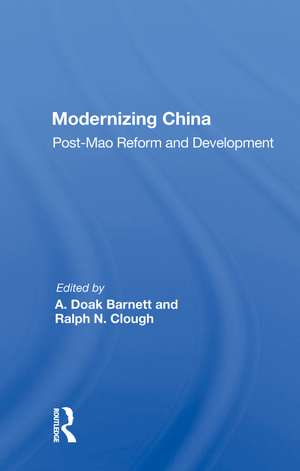Modernizing China: Post-Mao Reform and Development
Editat de A. Doak Barnetten Limba Engleză Hardback – 7 iun 2019
Preț: 764.20 lei
Preț vechi: 1027.40 lei
-26% Nou
Puncte Express: 1146
Preț estimativ în valută:
146.23€ • 152.67$ • 121.02£
146.23€ • 152.67$ • 121.02£
Carte tipărită la comandă
Livrare economică 04-18 aprilie
Preluare comenzi: 021 569.72.76
Specificații
ISBN-13: 9780367006396
ISBN-10: 0367006391
Pagini: 150
Dimensiuni: 146 x 229 mm
Greutate: 0.45 kg
Ediția:1
Editura: Taylor & Francis
Colecția Routledge
Locul publicării:Oxford, United Kingdom
ISBN-10: 0367006391
Pagini: 150
Dimensiuni: 146 x 229 mm
Greutate: 0.45 kg
Ediția:1
Editura: Taylor & Francis
Colecția Routledge
Locul publicării:Oxford, United Kingdom
Descriere
Since the death of Mao, China has entered a new period in its development. Turning away from the all-encompassing emphasis on revolutionary struggle and ideological transformation that characterized the last years of the Maoist era, China's leaders under Deng Xiaoping have initiated dramatic new reform and development policies. In original essays, the contributors, all senior specialists on contemporary China, analyze the reasons for the new policies, the nature and impact of the changes now occurring, and the prospects for a continuation of these policies in the future. Specifically, they examine the Chinese polity as a "consultative authoritarian" system, the farreaching changes in China's agriculture, important shifts in foreign economic relations, the gradual modernization policy pursued by its military leaders, the relaxation of controls on cultural life, and the possibility that current social policies may well increase equality rather than inequality in Chinese society. The authors conclude that it is too early to judge the eventual, long-term outcome of current reforms, which they believe grew out of the political crises and chronic economic problems that afflicted China in the late 1960s and early 1970s. Although they see some opposition and built-in limits to reform, on balance they foresee strong support for continued reform and believe it will be difficult for future leaders to reverse course.
